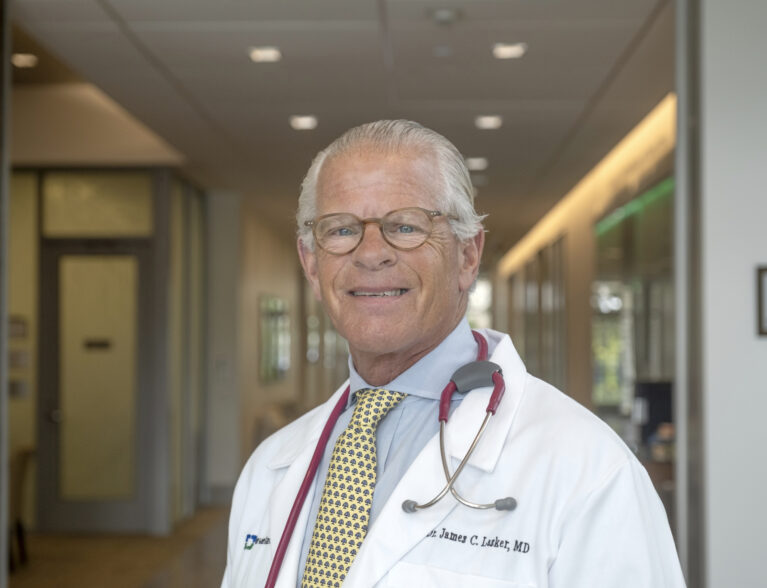
You’ve survived cancer. You’re in remission and you are cleared to go on with your life. But that’s easier said than done in most cases. You still lack energy. You still have pain from the treatment. You aren’t thinking clearly. You may be drowning in medical bills and living in fear that the cancer will come back.
Recognizing these difficulties, Cleveland Clinic Indian River Hospital just opened the Cancer Survivor Clinic to help survivors deal with the challenges they face.
“This is a relatively new area in medical oncology which is intended to look after patients that are cancer-free and to address the issues that may have developed as a result of their treatments,” explained Dr. James Lasker, Hematologist/Oncologist and director of infusion center and the survivorship clinic at Cleveland Clinic Indian River Hospital.
“Our clinic is for patients to enroll in after they’ve completed their therapy. Technically, survivorship in cancer starts at the time of diagnosis, but we’re not going to take the ones that are undergoing active treatment. They see their oncologist and their radiation therapist at that time.
“When you are diagnosed with cancer, there are three forms of therapy. There’s surgery, chemotherapy and radiation therapy. They can be used individually or all of them together.
“If we get the patient in remission, there are frequently side effects and what we describe as toxicities from these therapies that are long-lasting. Some of the chemotherapy drugs cause nerve damage in the hands and feet, some of them cause cardiac damage, some of them cause cognitive disabilities and that sort of thing. Radiation therapy is the same. They can get skin changes, burns, they can get cognitive deficits, that sort of thing. So as a patient in remission is going through life, we wish to address those issues and look after them and attend to them. And that’s what the survivorship clinics are for.
“The most common cancers are breast cancer, colon cancer and lung cancer, and all of them are treated with different types of drugs,” Dr. Lasker continued. “When we first meet with the patient we inquire about if they’re having any difficulties with long-acting side effects from their therapies.
“For instance, does the patient have numbness in their feet or in their hands? Do they have any shortness of breath or chest pain? Have they had any blood clots recently? Are they still having difficulty with abdominal discomfort or nausea from the medicines that they got when they had their colon cancer? Those are the sorts of questions we ask. Then we can look into them and address those problems.”
The cancer survivorship center offers survivorship sessions where patients can talk with others who had similar diagnoses and treatments along with a staff of trained professionals who can help them sort out some of the emotional effects.
For those with cognitive or concentration issues, often called chemo brain, the patient will be referred to a neurologist to see if there is anything that can be treated. Psychosocial problems like fractured relationships with family and friends that can result from these illnesses and treatments are addressed by social workers. Some people have trouble eating after cancer treatments and the healthcare providers at the center can help them establish a healthy diet.
“A new patient will generally meet with me individually for follow-up care. We might meet once every few months initially and less frequently after that. It depends on the type of cancer and treatment you had. “Dr. Lasker explained.
“If during my interactions we determine that the patient’s relapsed or developed a new cancer, we’ll send them back to their oncologist for treatment. If the patient is having psychosocial issues, we refer them to a psychologist who would meet with them individually and then graduate them to group sessions. We welcome spouses or significant others to join in the group therapies because they often volunteer very useful information and can help the patients through recovery.”
Thanks to early detection and newer treatments, more people are living longer after a cancer diagnosis, which has created a much greater need for cancer survivorship support. According to the National Cancer Institute, there are over 18 million people in the United States who are cancer survivors, meaning they have or had cancer.
An estimated 8 million people are living 10 or more years after diagnosis. Breast cancer and prostate cancer survivors represent the highest survival rates with more than 98 percent of men and 84 percent of women still alive 10 years after diagnosis. Ten-year survival rates for other cancer types range from more than 50 percent for people with colorectal cancer and gynecologic cancers to more than 70 percent for people with melanoma.
Over the next 10 years experts anticipate a 24 percent increase in the number of people living with cancer.
Cancer inevitably changes the lives of the people it touches. Cancer survivorship treatment helps people live with those life changes and regain a good quality of life. The staff at Cleveland Clinic’s cancer survivor clinic creates a cancer survivorship plan tailored to each patient’s specific needs and supports the patient through the healing process.
Dr. James Lasker completed his medical education at Temple University School of Medicine in Philadelphia, Pennsylvania, followed by his internship and residencies in Internal Medicine and Neurology at Emory University Affiliated Hospitals in Atlanta, Georgia. He engaged in fellowships in Medical Oncology and Hematology at Baylor College of Medicine Affiliated Hospitals and a fellowship in Bone Marrow Transplantation at MD Anderson Cancer Center in Houston. To learn more about the Cancer Survivorship Clinic at the Scully-Welsh Cancer Center located on the campus of Cleveland Clinic Indian River Hospital, call 772-563-4673.



